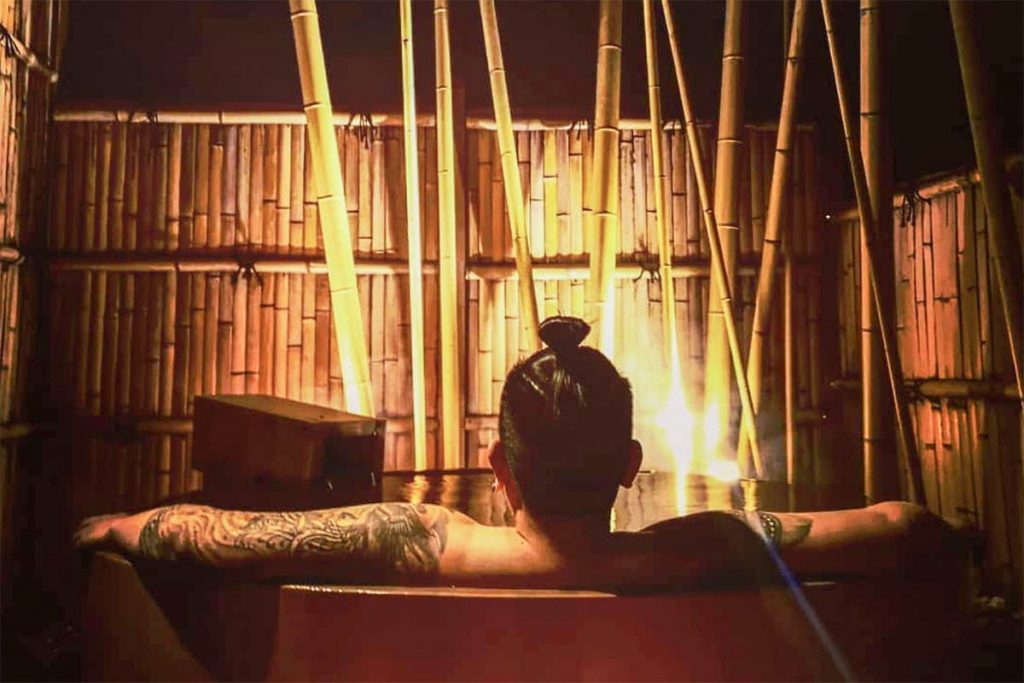
Are you looking for a tattoo-friendly onsen in Japan?
Many travelers worry that tattoos are not accepted at Japanese hot springs.
Traditionally, tattoos in Japan were associated with the yakuza, and many public baths still refuse entry to tattooed guests.
But don’t worry — there are options!
At our Shima Onsen Kashiwaya Ryokan, we welcome guests with tattoos.
Our private hot spring baths make us one of the most popular choices for travelers searching for a tattoo-friendly ryokan in Japan.
And in fact, all of our baths are tattoo-friendly as well, so you can relax and enjoy the hot springs with complete peace of mind.
Although, you still need to follow the manners and etiquette of using onsen in Japan, because we all share onsen, and we all have responsibility to keep the onsen clean and comfortable.
Please read the article “How to Take an Onsen?” for the further details.
Can You Enter an Onsen with Tattoos?
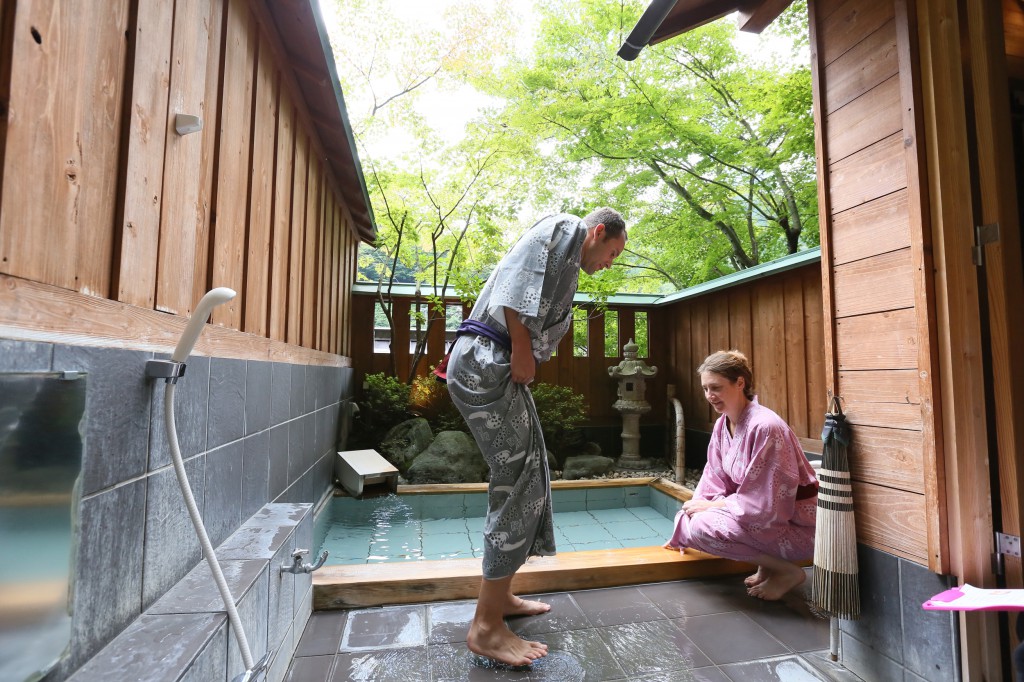
In many traditional onsen, tattoos are still not allowed.
Signs at the entrance may say “No Tattoos.”
However, more and more places are becoming tattoo-friendly onsen to meet the needs of international guests.
At Kashiwaya Ryokan (in Shima Onsen, Gunma Pref.), you don’t have to worry.
Tattoos are completely accepted in all of our onsen baths including public baths, and guests with tattoos can relax and enjoy the onsen without hesitation.
Why Are Tattoos Banned in Many Japanese Onsen?
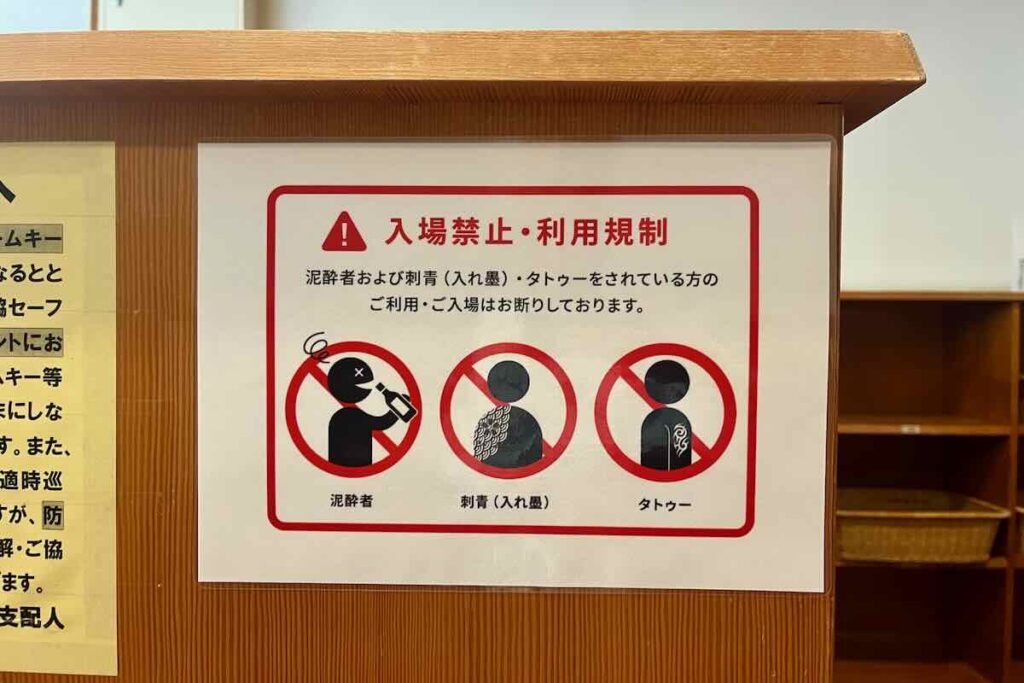
In Japan, tattoos — called irezumi — have long been associated with anti-social groups or criminal organizations. This historical background is the main reason many onsen traditionally prohibit guests with tattoos.
The history of tattoos in Japan is actually quite fascinating, because they have carried both positive and negative meanings over time. According to sources such as Wikipedia, tattoos were already widespread in the Jomon–Yayoi periods, when Japan had one of the world’s most developed tattoo cultures. Decorative tattoo culture flourished during the Edo era as well.
However, tattoos also came to be seen in a negative light. In the Edo period, criminals were sometimes tattooed as punishment. Later, during the Meiji era through the end of World War II (1880–1948), tattoos were outlawed. More recently, tattoos became strongly associated with the yakuza, Japan’s organized crime groups, who used them as a way to show strength and power.

Cultural anthropologist Yoshimi Yamamoto has written that the widespread idea “tattoo = yakuza” was reinforced in the 1960s and 70s, when Japanese cinema produced a wave of yakuza movies featuring heavily tattooed gangsters.
Because of this history, the image remains deeply rooted in Japanese society that “people with tattoos = anti-social forces.” For onsen operators, there is a real concern that other customers may feel uncomfortable or even avoid the baths if they see someone with tattoos. Since onsen are part of the hospitality industry, many facilities have chosen to restrict tattoos to avoid potential problems.
At the same time, it can feel unfair to deny bathing to people who have no connection to crime, simply because they have tattoos. In recent years, more onsen have begun to allow tattoos — sometimes with conditions, such as permitting only small tattoos or requiring them to be covered with a sticker. Still, the number of such facilities remains limited.
Overall, most hot springs in Japan are not yet fully tattoo-friendly, although the situation is gradually improving.
Kashiwaya Ryokan: Tattoo-Friendly Stay with Free Private Onsen and Open-Air Bath Rooms
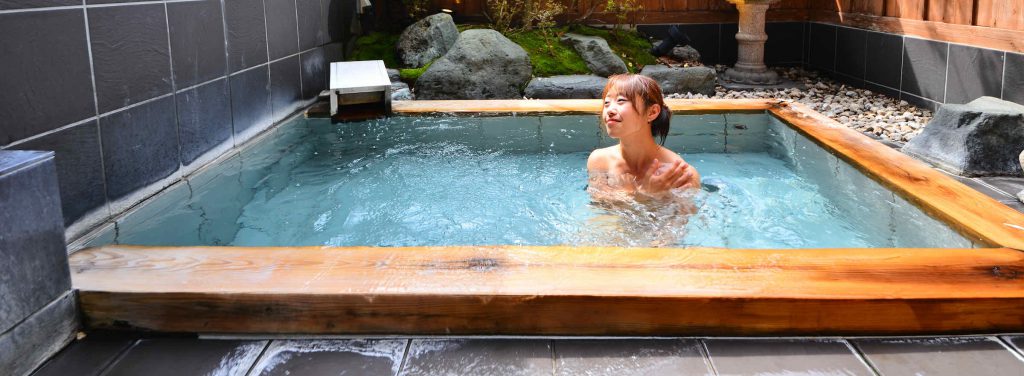
At Shima Onsen Kashiwaya Ryokan, guests with tattoos can fully enjoy the hot springs without worry. Here’s why:
1. Tattoo-friendly onsen ryokan
Our ryokan welcomes guests with tattoos. You can relax in our hot spring baths without concern, unlike many traditional facilities in Japan.
2. Guest rooms with private onsen
We offer two special rooms, Hana and Kame, each equipped with a private hot spring bath. These rooms allow you to enjoy the healing waters in complete privacy.
3. Three free private open-air baths
In addition to the public baths, we provide three private open-air baths that can be reserved free of charge. No matter which room you stay in, you can still experience a peaceful onsen time without sharing with other guests.
While attitudes toward tattoos at onsen in Japan are gradually changing, choosing a tattoo-friendly ryokan with private hot springs remains the best option for a stress-free experience.
Enjoy the soothing waters, follow good bathing manners, and make the most of your trip to Japan!
Tattoos in Japanese Onsen: Background, Current Trends, and Tips for Guests
Inbound travel reached 32 million visitors in 2019, but after the pandemic it rebounded to a record 37 million in 2024. The national goal is to welcome 60 million visitors by 2030.
That’s why I believe we need to gradually adapt some of our long-standing customs so that guests from around the world can feel truly comfortable during their stay.
However, when it comes to the issue of tattoos, it seems it will still take quite some time.
Japanese Attitudes Toward Tattoos and Onsen
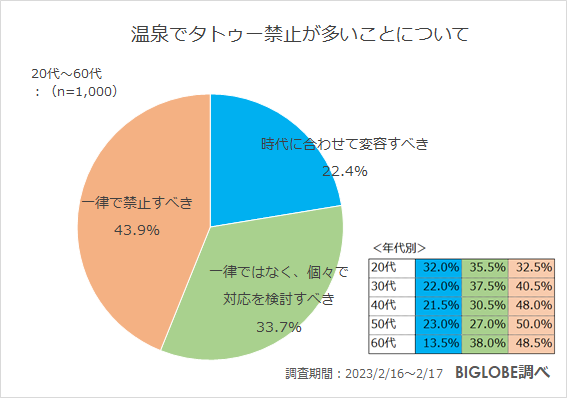
One major reason why change may take time is the mindset of Japanese people themselves.
According to a 2023 survey by BIGLOBE Onsen, one of Japan’s leading hot spring portal sites, 44% of respondents said that tattoos should be strictly prohibited in public baths.
The only age group showing relatively more tolerance was people in their 20s, while those in their 30s and older tended to remain less accepting.
Government Survey on Tattoos and Onsen
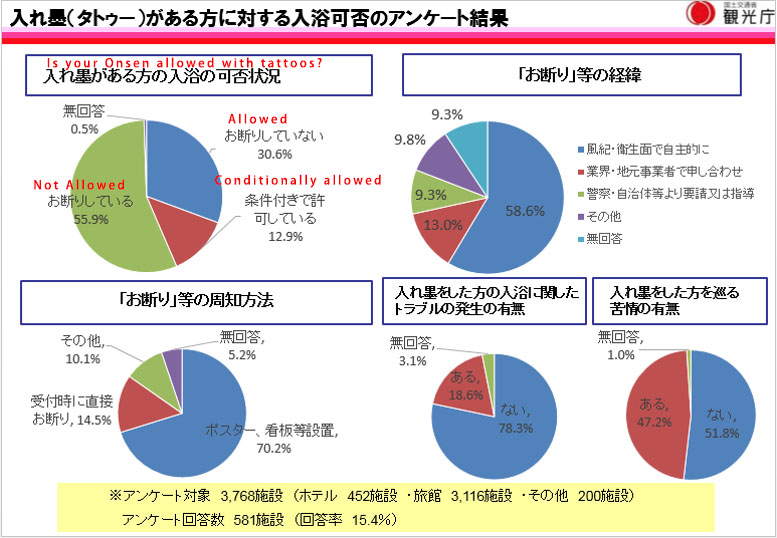
Although it is quite dated (from 2015), the Japan Tourism Agency conducted a survey on how onsen facilities deal with tattooed guests, noting that “trouble has arisen when foreign tourists with tattoos attempt to bathe.”
The results showed that more than half of onsen facilities at the time refused entry to people with tattoos.
While the Agency carried out the survey, it did not present any clear conclusions about how to move forward. Instead, it only stated: “For the time being, we will make efforts to provide appropriate information on tattoos so that both onsen operators and users can avoid trouble.”
Rugby World Cup Brings Tattoo Debate to the Surface
In 2019, when the Rugby World Cup was held in Japan, public debate over whether to accept tattooed visitors flared up, and there was hope that attitudes might change rapidly.
However, with the sharp drop in foreign tourists during the pandemic, the discussion stalled once again.
(The Guardian – Rugby World Cup: All Blacks cover up tattoos in Japan to tackle yakuza link)
The Dilemma of Ryokan Owners over Tattoos
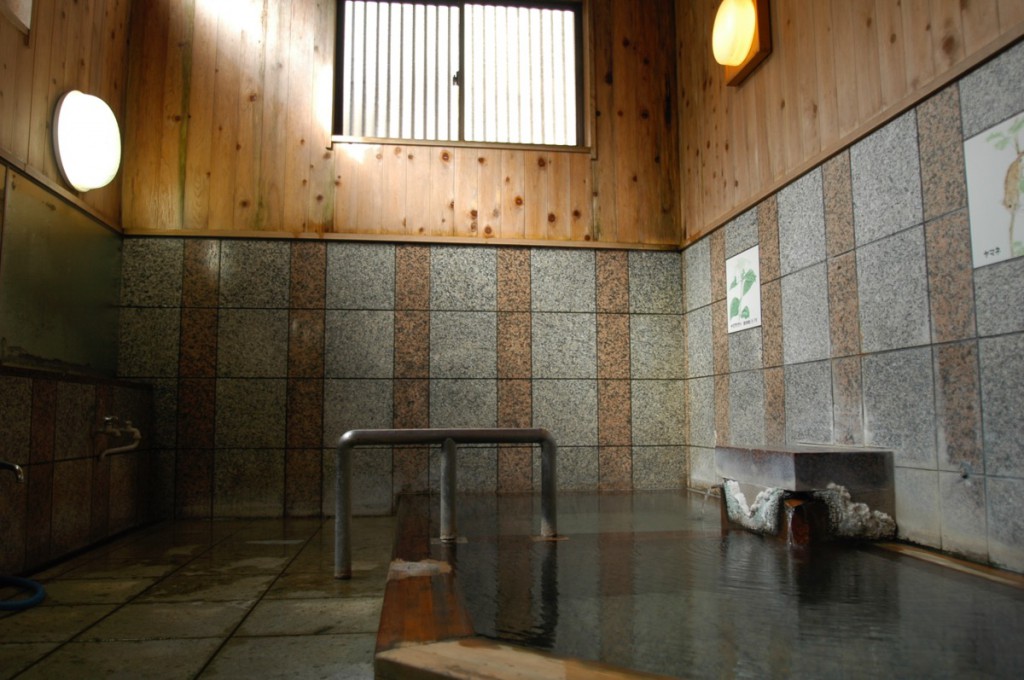
A 2022 paper by SEKIYA Daiki highlights the ongoing dilemma faced by many ryokan owners regarding tattooed guests.
While some owners believe that refusing tattooed guests is simply a form of prejudice, others feel they must consider the comfort and expectations of other visitors.
For example, some owners state:
“If we know in advance that a guest has tattoos, we generally decline their use of the onsen baths”
“Considering other guests, we may have no choice but to decide that accepting tattooed bathers is difficult.”
“I belive refusing batherss with tattoos is nothing but prejudice.”
These perspectives suggest that many ryokan owners are particularly concerned about how other guests will react.
For operators managing inns with a large number of visitors, such worries are perhaps unavoidable, and it seems likely that this dilemma will persist for some time.
Tips for Guest with Tattoos
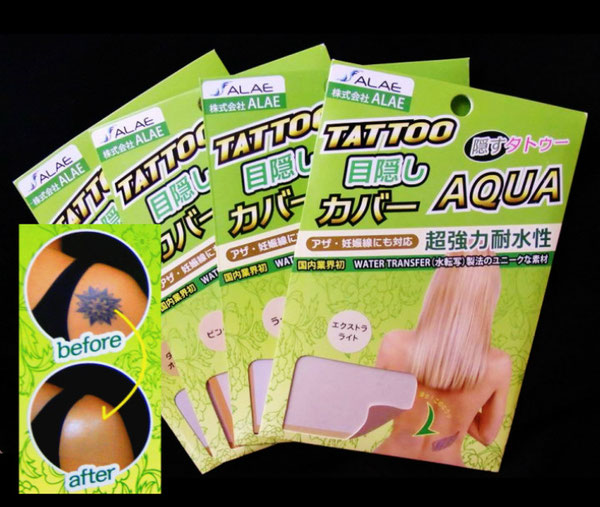
If you have tattoos and want to enjoy an onsen in Japan, here are some practical tips:
1. Choose tattoo-friendly ryokan – Some inns, such as Shima Onsen Kashiwaya Ryokan, openly welcome tattooed guests, allowing you to bathe without concern.
2. Opt for private baths or rooms with open-air baths – Many ryokan offer private or reservable baths, and Shima Onsen Kashiwaya Ryokan also provides this option, ensuring a stress-free experience.
3. Use tattoo cover stickers – For small tattoos, cover stickers can help you gain access to certain public baths. These stickers are popular among foreign visitors and can be purchased at stores like Don Quijote or Matsumoto Kiyoshi.
4. Check policies in advance – Always confirm the onsen’s rules regarding tattoos before booking, especially if your tattoos are large or visible.
By planning ahead and choosing accommodations carefully, tattooed guests can still enjoy Japan’s hot springs comfortably while respecting local customs and other visitors.
If you interested in Japanese style Onsen, Please click here
Shima Onsen Kashiwaya Ryokan >

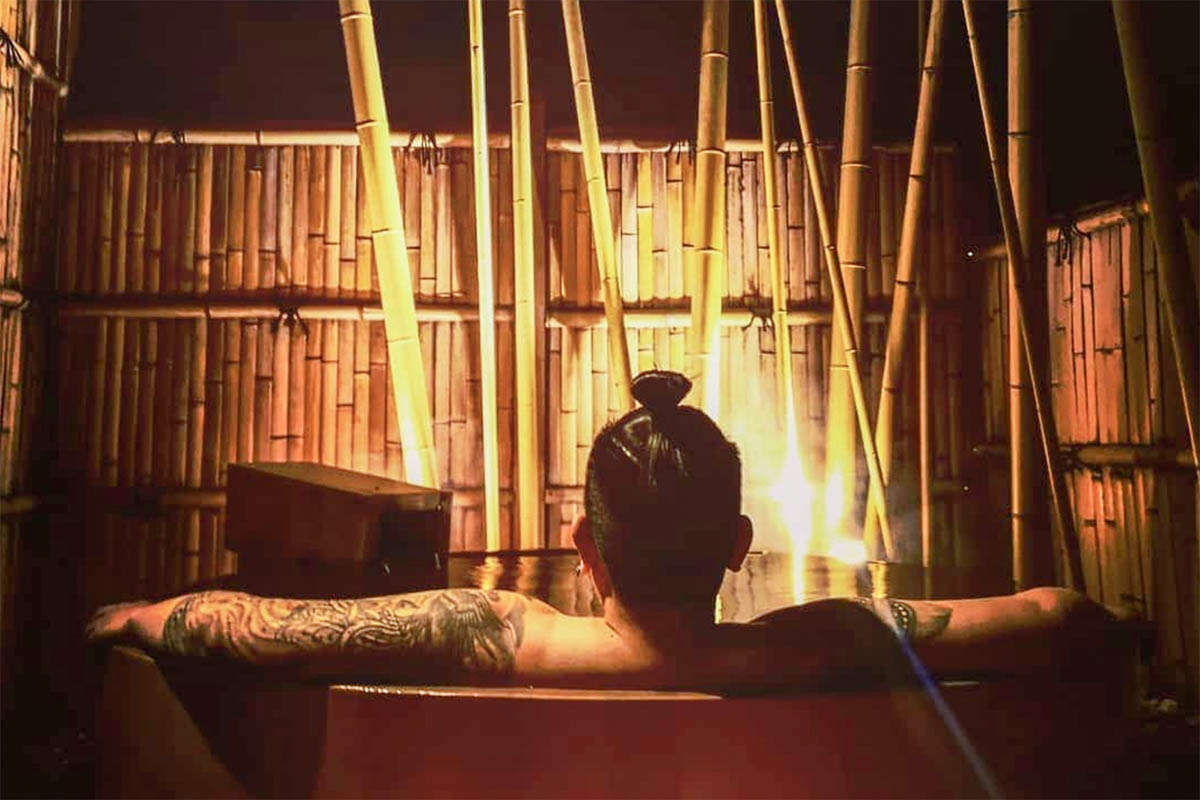



Comments
[…] As I wrote in a previous blog, there are still many facilities to prohibit people with tattoos because the custom that “people with tattoos are anti-social forces, such as gangsters” has been very strong since ancient times. […]
[…] with tattoo cannot take onsen due to cultural differences here in Japan. However, in Shima onsen Kashiwaya Ryokan, you can enjoy onsen without hesitation even with tattoos because there are three free private onsen and two rooms with open-air baths. […]
My wife and I are planning to visit Kashiwaya the next time we come on business to Japan! This post helps a lot because I have a small tattoo on my foot.
Thank you! We are looking forward to seeing you!
It’s nice to see the culture surrounding tattoo’s is changing. Hopefully more ryokan will start accepting tattooed customers in the near future.
I’ve wanted a tattoo of Kinosaki-onsen for a long time but I can’t get it or else I won’t be able to go there anymore 🙁 Kind of ironic…
Thank you for the information 🙂
I always recommend people with tattoo who want to go to Onsen “Tattoo covering” service in Asakusa. It says that the tattoo-cover last up to 5 days and is completely painless and water proof. The price is also cheap!
Asakusa is easy to access for tourists.
Hopefully, more people with tattoo could go to Onsen.
Thank you for this article! I have a small tattoo, so trying to plan a trip to Japan seems daunting with the restrictions. I worry about offending people without meaning to. This article is very reassuring to me! Thank you very much.
My daughter is doing University in Japan and I am planning to go visit and also enjoy onsen but I have a small tattoo in my foot. She has one behind her neck and I guess they have not checked her out because she has visited one before. I really would love to visit Japan, also love tattoos but not getting one just because I want to have this experience and visit my kid many more times without getting in trouble.
I am staying at Hotel Paco in Hakodate. Written policy is no tattoos in Onsen. Desk staff told me to go in after midnight when there should be few people.
I entered at 6pm and kept my two tattoos as inconspicuous as I could – no problems.
I think it is very important to mention here because it is not mentioned. In Japan so called “members of anti-social forces” have a quite big power in the society (it can depends on the district though.), an Japanese would really avoid to get visit from such people.
When you start a new restaurant or cafe in Japan, you might get a visit from such people in the beginning and they demand you to pay some money otherwise they might come back with many members with a lot of tattoo and threat other usual people in the restaurant. In the end you cannot any more continue to have business. It sounds very difficult to get rid of them if once you have started to have a problem with them.
Such people have (probably) always have tattoo, and thats why Japanese want to have such rule in Olsen and such places in order to avoid getting involved with mafia group.
Thank you for your article. My family and I are planning a trip to Japan, and want to experience the traditional onsen. I am now doing some research regarding tattoo friendly ryokans, since I myself have tattoos on my arms, and came across your article.
It is a little disheartened to think that I’ll be rejected from onsens because of my look. But on the other hands, I understand the reason behind it.
I guess we have to respect the culture of local people and be responsible in our traveling.
The article is a few years ago, so I hope the situation is getting better now.
Thank you for your comment.
I’m sorry for the late reply.
The situation is not getting better.
Many onsen hotels continue to reject guests who have tattoos.
I am disappointed about that.
However, it may still take quite some time for the situation to improve.
It’s great to know that Shima Onsen Kashiwaya Ryokan welcomes guests with tattoos! It’s a shame that so many onsen still have strict rules against tattoos, but places like yours make it possible for everyone to enjoy the onsen experience without concern. I appreciate your efforts to provide private onsen options and create a more inclusive environment for all visitors. Keep up the excellent work!
Thank you for your heartwarming comment. We are grateful to welcome guests with tattoos from all over the world, having heard that our inn is tattoo-friendly.
If you have the chance, please come and stay with us.
Thank you!